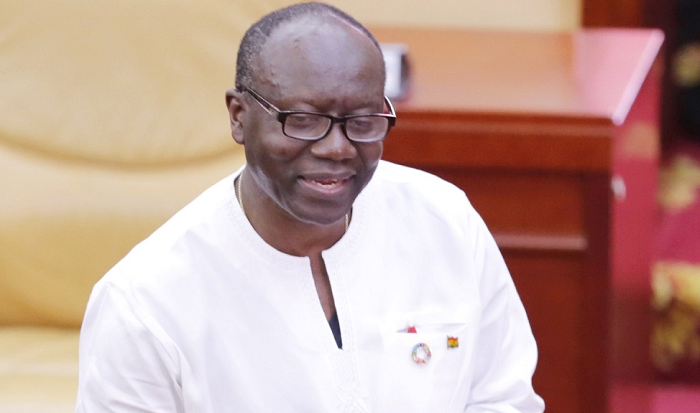The Finance Ministry has dismissed reports that Ghana’s economy is running into financial challenges, saying, the country does not face any imminent external imbalances or reserves shortfall.
“The reserves, at over 5 months of import cover, is well above our internal target of four months and better than the average over the previous two decades. Foreign financing of the 2022 Budget, of $1.5 billion is also bolstered by the balance of Special Drawing Rights of approximately $700 million”, it disclosed in a statement.
Bloomberg last week reported that “Ghana Debt Moves Deeper into Distress as Investors lose Patience”.
But the Finance Ministry said “like all emerging market countries with foreign investor participation in our domestic debt, Ghana is susceptible to a tighter US Monetary Policy stance. However, Ghana has healthy reserves of over 5 months of import cover amidst reduced levels of foreign investor participation in our domestic market. As of November 2021, our data indicates that only 16.55% of our domestic debt is held by non-residents investors as compared to 38.44% and 30.01% in 2017 and 2018, respectively”, it pointed out.
Explaining further, it said “whereas we acknowledge that the current trading levels of our Eurobonds have widened, we do not believe that it is warranted nor do we believe that it reflects the strong underlying fundamentals of the Ghanaian economy and our rapid rebound post the Covid-19 pandemic as evidenced by the healthy Gross Domestic Product growth of 6.6% for the third quarter alone and an average of 5.2% for the first three quarters of 2021. While the end year growth targets for 2021 has been revised to 4.4%, high frequency indicators suggest a continued strong momentum in economic activity in the fourth quarter".
Despite the global challenges that exists on the back of the Covid-19 pandemic and especially in emerging markets, the Finance Ministry reassured all its investors that Ghana’s fundamentals remain strong as attested to by the growth in the third quarter 2021, the Ghana Revenue Authority exceeding its target in 2021 and the strong reserves position.
“Ghana will continue to show leadership in these difficult post-Covid-19 era to build a sustainable, entrepreneurial nation while ensuring that growth, job creation and fiscal consolidation are not compromised, in line with the President’s vision of a Ghana Beyond Aid”, it added.
Finance Ministry dismisses Bloomberg’s report
The Finance Ministry dismissed Bloomberg’s report, saying, there are some serious factual errors in the article, which may give investors some cause for concern, if not corrected.
“For example, Bloomberg stated 81.5% as end of year debt to GDP ratio. This is incorrect. Our provisional nominal debt to GDP, as at the end of November 2021 was 78.4%, which is the latest data available. December revenue collections are seasonally the largest for any year, it is unlikely that our financing requirements in December will result in us exceeding 80% debt to GDP by December 2021”, it stressed.
“The Bloomberg article gave wrong historical debt to GDP figures. It is essential we make the correction that Ghana’s debt to GDP figures a decade ago were 39.67% and 47.80% for 2011 and 2012, respectively, and not 31.4% as stated in the Bloomberg publication. Again, it is important to note that for the period prior to the COVID-19 global pandemic, Ghana experienced an average debt-to-GDP ratio of 56.4% from 2015 to 2019. In 2020, Ghana's GDP grew by 0.4% because of the impact of the Covid-19 Pandemic on the economy”, it noted.
It further added that financing of the additional Covid-19 related expenditures, in addition to revised revenue targets, due to the impact of the pandemic, led to an increase in debt-to-GDP from 62.4% in 2019 to 76.1% in 2020.
The Finance Ministry alluded that the current 78.4% debt-to-GDP ratio as at the end of November 2021 indicates rather a reduction in the rate of debt accumulation (a declined by a half to 18% as of November 2021 from 34% in 2020).
“This attests to an improvement in our debt and liability management, contrary to what the article seeks to suggest. Furthermore, with the positive Primary balance target for 2022 – one of the key fiscal anchors in 2022 - Ghana should see improved stability and reduction in the debt to GDP ratio in 2022 and through the medium term”, it conlcluded.
Latest Stories
-
Daughter killed in father’s arson attack over sex denial
1 hour -
NPA Scandal: Four suspects remain in custody after failing to meet bail conditions
2 hours -
NPP to open 2028 flagbearer nominations on July 29
3 hours -
Sam George to open Pan-African AI Summit 2025
3 hours -
NDC opens nominations for Akwatia parliamentary primaries on July 28
4 hours -
Guinness Ghana DJ Awards opened new doors for my career – DJ Pho
4 hours -
Mohammed Sukparu commits to advancing Ghana’s Artificial Intelligence agenda
5 hours -
‘What is coding?’ – Question raises eyebrows during Deputy Communication Minister-nominee’s hearing
5 hours -
WAFCON 2024: Ghana’s Black Queens claim third-place after penalty win over South Africa
5 hours -
Ghana celebrates 100-year-old WWII veteran Joseph Ashitey Hammond
6 hours -
Measures announced in Mid-Year Budget Review fully in line with programme objectives – IMF
6 hours -
This Saturday on Newsfile: AG drops charges in uniBank trial, Aud-General’s report, and Mid-Year Budget Review
6 hours -
Parliament passes Road Maintenance Trust Fund Bill
7 hours -
Heavy security deployed at Manhyia Palace following Asawase shootings
7 hours -
Kumawu MP Ernest Anim urges Parliament to act on crisis in Ghana’s prisons
7 hours

